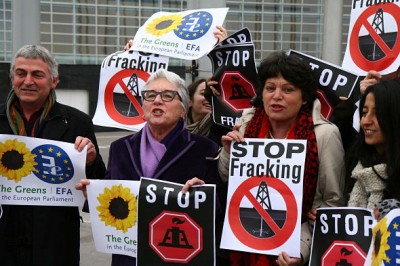Fracking Goes on Trial

Image: Green MEPs protested against Shale Gas outside the European Parliament 2012. greensefa under a Creative Commons Licence
News was announced today (23 July) that a coalition of human rights lawyers and academics will put fracking on trial at hearings to be held in Britain and the United States.
The Permanent Peoples’ Tribunal (PPT), based in Rome, is a descendant of the 1967 Vietnam War Crimes Tribunal and hears cases in which prima facie evidence suggests a breach of the basic rights of ordinary citizens. Between 5 and 7 jurists of high standing in international human rights will hear witness testimony on the issue of fracking before deciding whether sufficient evidence exists to indict certain nation states on charges of ‘failing to adequately uphold universal human rights as a result of allowing unconventional oil and gas extraction in their jurisdictions’.
Fracking has taken place around the world in spite of powerful public opposition and with large numbers of citizens claiming that their concerns and human rights have been ignored by those who are meant to represent them. Importantly, this PPT will examine those allegations in an ‘even-handed and judicial way’ and will consider the indictment of nation states, rather than the industry itself, because states, not the fracking companies, bear a direct legal responsibility to human rights law.
The human rights dimensions of a whole range of potential impacts will be examined: human and animal health, environmental, climatic, seismic, hydrologic and economic impacts – as well as those on local physical and social infrastructures.
Exercising a truly global reach, testimony will be invited from witnesses all over the world – who may also wish to hold preliminary mini-tribunals in their own countries. Evidence and findings from those early tribunals can then be submitted to later plenary hearings in the US and Britain which, in turn, will play an important role in laying down an informal but highly expert precedent, with potential for future use in national and international courts of law.
For me, as a campaigner, a crucial feature of this PPT relates to how it will respond to what 20th century philosopher and mathematician Bertrand Russell described as ‘the crime of silence’. Since the Vietnam War Crimes Tribunal of 1967, this term has been widely used to refer to the wrongs suffered by all violated communities. I believe it is extremely relevant for those of us engaged in the current struggle against fracking.
The unconventional gas and oil industry is highly potent. Its wealth affords it the ability to lobby governments and powerful individuals; to engage PR companies and to influence the media with the promotion of its own agenda – at the expense of important truths.
In the US, the ‘Halliburton Loophole’, by which hydraulic fracturing was made exempt from the Safe Drinking Water Act 2005, had the effect of smothering evidence of water contamination by driving those affected by contamination directly to the companies involved. Offers of compensation were often dependent upon the signing of non-disclosure agreements – with lifetime gag orders given to children as young as 7 years old.
While the fracking industry and the politicians who support it continue to deny evidence that fracking causes harm, the List of the Harmed, compiled by the Pennsylvania Alliance for Clean Water and Air, currently itemizes no fewer than 16,000 instances of harm from the oil and gas industry – accounts that are dismissed as ‘anecdotal’ by those who have a vested interest in driving the truth further underground with drilling.
Government reports on the negative effects of fracking are redacted; ministers and industry personnel escape public scrutiny by refusing to attend debates, and democracy is eroded with government plans to limit the consultation periods for communities to object to fracking applications – none of which diminishes the commitment of those same communities to line up against fracking in a fight that might rightly be billed as ‘passions versus payroll’.
While the vast majority of fracking victims cannot afford to gain a legal hearing, let alone reparation for their harm, campaigners have fought on their behalf, and our own, for justice and the exposure of truths that governments and fracking companies would prefer remain hidden in redaction or denial. The PPT on fracking now promises a route to justice by offering a legitimate platform to those whose voices, until now, have been silenced.
There can be no justice without truth and the first step of an important journey toward revealing the truth behind fracking has been taken today with news of the Permanent Peoples’ Tribunal.
You can support the Permanent Peoples’ Tribunal on fracking by submitting testimony, organizing smaller national re-PPT initiatives and/or helping with the crowdfunding of tribunal costs: tribunalonfracking.org
Julie Wassmer is a writer and environmental campaigner. A member of East Kent Against Fracking and Mothers Against Fracking, she also sits on the Environment Committee of CPRE Kent.

